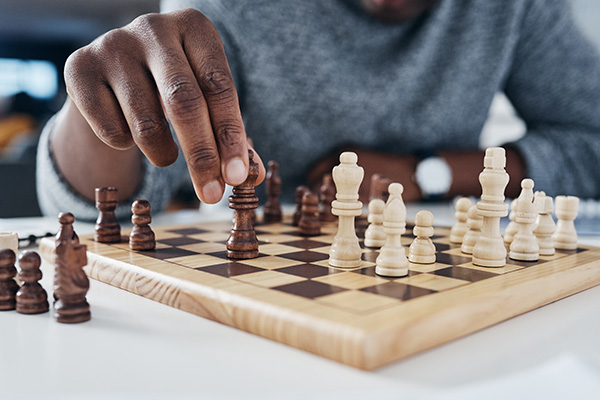Bored? Try These Fun Brain Games for Adults

Binge-watching an entire TV series is an easy escape from everyday stress.
But even if you’re sucked into a complex drama about chess or a cleverly spun whodunit, studies have found too much TV can dampen your memory capabilities.
So balance out that must-see TV with some real-life brain games for adults.
“Our brains love to be stimulated with challenges and opportunities to learn, so anytime you can actively engage that process, your brain will reward you,” explains Natalie Dattilo, Ph.D., MHA, director of psychology at Brigham & Women’s Hospital.
“Learning and other brain-stimulating tasks create stronger neural connections, and we know that a well-connected brain is a healthy brain,” she adds.
Brain games for adults are a fun way to challenge your mind, especially when you’re spending more time indoors.
Here are some online and offline options for lighting up your gray matter.

1. Strategy games
Chess is a classic strategy game, which studies have found might improve some memory functions, or Go is another ancient strategy game popularized in the movie “Knives Out.”
Even if you don’t win, there are still benefits.
“Focusing your attention intently on a task, game, puzzle, or project can help you stay sharp, improve your mood, and decrease stress,” explains Dattilo.
Online, you can play these strategy games against friends, other humans, or AI opponents.
2. Word games
Whether it’s a heated Scrabble match in real life or Words With Friends online, word games are accessible to everyday players.
“We use language daily, and these types of games are within our wheelhouse, yet still challenging,” explains Julie Brody Magid, Psy.D., neuropsychologist and clinical director for the McLean Hospital Memory Disorders Assessment Clinic.
“There’s also a strategic element in word generation and placement to maximize your points,” Magid explains.
Studies have also found expert Scrabble players may develop some faster cognitive functions,
3. Crossword puzzles
Inspired by a good crossword puzzle?
An Internet search will provide you endless, free options from newspapers you can do online.
Research has indicated that crossword puzzles might keep your memory sharp as you age.

4. Logic puzzles
It may look like a crossword puzzle with numbers, but Sudoku is a logic-based grid.
In classic Sudoku, the goal is to fill each column and each row so that it contains all of the digits from 1 to 9.
“Like exercise, games vary in complexity,” explains Brody Magid. “It’s important to find a level that pushes you but doesn’t overly frustrate you. There’s a mastery component because it’s satisfying to push hard and finish a task.”
Sudoku puzzles range in difficulty from beginner to tricky, and you’ll find free brain games online or plenty of apps for Android or iOS.
5. Jigsaw puzzles
Serious jigsaw puzzle purists won’t look at the box when assembling these oddly shaped tiles into a final image.
Research has found jigsaw puzzling can potentially tap into multiple cognitive abilities.
6. 3-D combination puzzles
Looking for an alternative to mindlessly scrolling through your phone when you’re bored?
A Rubik’s Cube and other twisty puzzles like the Megaminx keep your mind and hands busy when you’re feeling restless and require excellent spatial abilities to solve, according to some researchers.
Some people are just naturally good at them, but if you take your time or follow a guide, you can discover how satisfying it is to solve one — and start all over again.
7. 2-D video games
The primary goal of Tetris is to turn and fit falling puzzle pieces into complete rows.
Researchers have looked into the positive effects playing Tetris may have on the visual perception of the spatial relationship between objects.
Evidence also suggests that other 2-D video games like Angry Birds might also have cognitive benefits.
8. 3-D video games
Studies have found that our brains benefit from exposure to new places — even new virtual places like 3-D game scapes.
Switching your TV remote for a game controller could potentially help your brain.
9. Brain-training apps
Developed by researchers, Lumosity takes cognitive training exercises and turns them into easy-to-learn brain games designed to improve memory, increase focus, and feel sharper.
While the FTC took the company to task for overpromising on benefits, it’s still a popular platform for brain games for adults.
“Broadly speaking, games provide the new experiences our brains need and support cognitive reserve and resiliency,” says Brody Magid. “Games are not necessarily prescriptive or preventative, but they do boost and protect our brain function.”
So go ahead and give your mind a mental workout!
